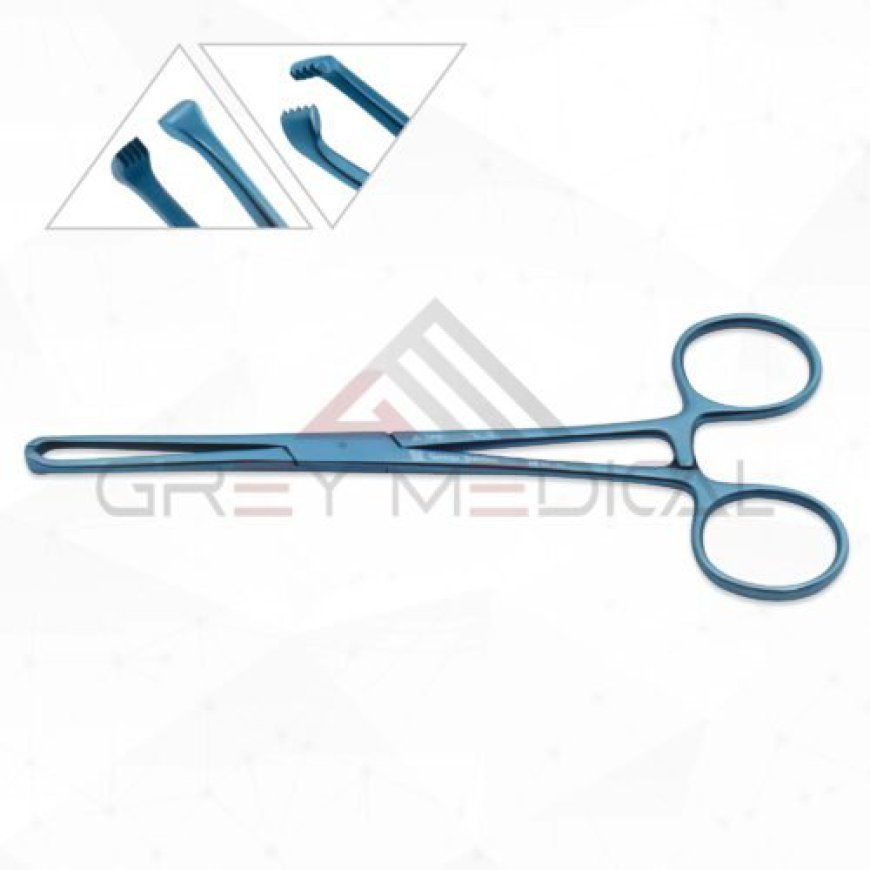Allis Forceps: A Key Instrument for Surgical Precision and Efficiency
• Features a ratchet ring handle with various sizes and types of teeth. • Curved teeth reduce tissue damage due to decreased pressure. • Made from premium German Stainless Steel.

In the world of surgery, precision is critical to ensuring the success of the procedure and the well-being of the patient. Allis forceps, a specialized tool used by surgeons worldwide, are designed to enhance precision and improve efficiency during a variety of procedures. Their unique design allows surgeons to handle delicate tissues securely, making them an essential instrument in many medical fields, from general surgery to gynecology.
Understanding the Design of Allis Forceps
Allis forceps are known for their distinctive ratchet mechanism and serrated, broad jaws that allow the surgeon to grasp tissues firmly. The ratchet lock ensures that once the tissue is secured, it remains in place without the need for constant pressure from the surgeon’s hands. This is especially beneficial in procedures where the surgeon requires both hands to focus on other aspects of the operation, freeing up their grip while maintaining control of the tissue.
The jaws of the Allis forceps are flat and have sharp serrations that grip tissues effectively without crushing them. This feature is crucial, as it allows the surgeon to hold delicate organs or tissues without damaging them, which is vital for maintaining the integrity of the tissue being operated on. The broad, flat design of the forceps also reduces the risk of unnecessary trauma, making the instrument ideal for procedures that require a light, but secure, hold.
Applications Across Surgical Specialties
The versatility of Allis forceps makes them indispensable in various surgical disciplines. In general surgery, they are often used to hold tissues back during procedures, such as removing tumors, repairing damaged organs, or excising abnormal growths. These forceps are particularly useful in surgeries where access to deeper structures is required, as their design allows surgeons to reach confined areas effectively.
In gynecological surgeries, Allis forceps are a staple tool for grasping and holding tissue, especially during operations like hysterectomies, cervical biopsies, and fibroid removals. Their ability to hold tissues securely without causing excessive force or trauma is critical in these delicate operations. The forceps also see frequent use in obstetrics, especially during cesarean sections, where they help stabilize tissue and improve access to the uterus.
Precision and Control for Complex Procedures
The precision and control provided by Allis forceps make them essential for complex surgeries. The ratchet mechanism ensures that once the tissue is grasped, the forceps hold it securely without requiring constant manual pressure, allowing the surgeon to focus on other aspects of the procedure. This feature reduces fatigue and enhances the surgeon’s ability to perform lengthy operations with consistent focus and accuracy.
The serrated jaws of the Allis forceps provide a firm grip on the tissue, which is especially important when dealing with challenging or hard-to-reach structures. By distributing pressure evenly, the forceps minimize the risk of tissue damage, reducing the likelihood of complications such as bleeding or tearing. This feature is particularly important when handling sensitive tissues like blood vessels, nerves, or organs that need to be manipulated with care.
Durability and Ease of Sterilization
Allis forceps are typically made from high-quality stainless steel, ensuring durability, strength, and resistance to corrosion. Stainless steel is an ideal material for surgical instruments due to its ability to maintain sharpness, withstand wear, and resist rusting. The durability of Allis forceps means they can withstand repeated use in high-demand environments without compromising their effectiveness.
In addition to their durability, stainless steel construction makes Allis forceps easy to sterilize. As surgical instruments, cleanliness and hygiene are paramount, and the smooth surface of Allis forceps ensures that they can be easily cleaned and disinfected between uses. This is essential for maintaining patient safety and preventing the risk of infection during surgical procedures.
Conclusion
Allis forceps are a versatile and essential tool in modern surgery. Their unique design, combining precision, control, and durability, makes them invaluable in a wide range of surgical procedures. Whether in general surgery, gynecology, or obstetrics, Allis forceps offer surgeons the ability to grasp and hold tissues securely while minimizing the risk of damage. The ergonomic design and ease of sterilization further contribute to their popularity and long-term use in surgical settings. With their continued reliance in various specialties, Allis forceps remain a cornerstone of surgical practice, ensuring greater precision, safety, and efficiency in the operating room.

 Greymedical
Greymedical